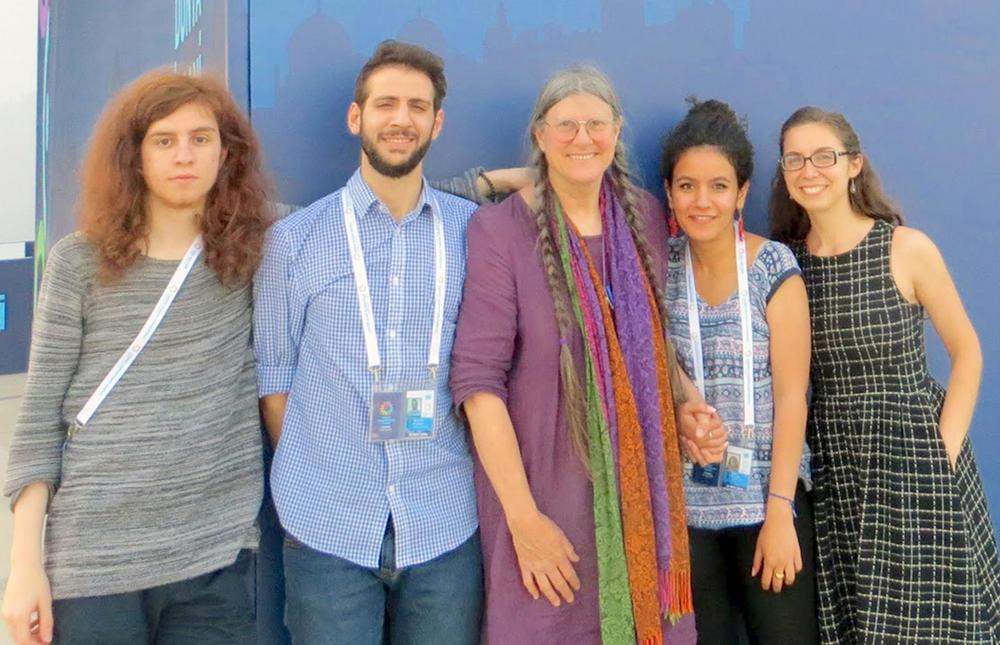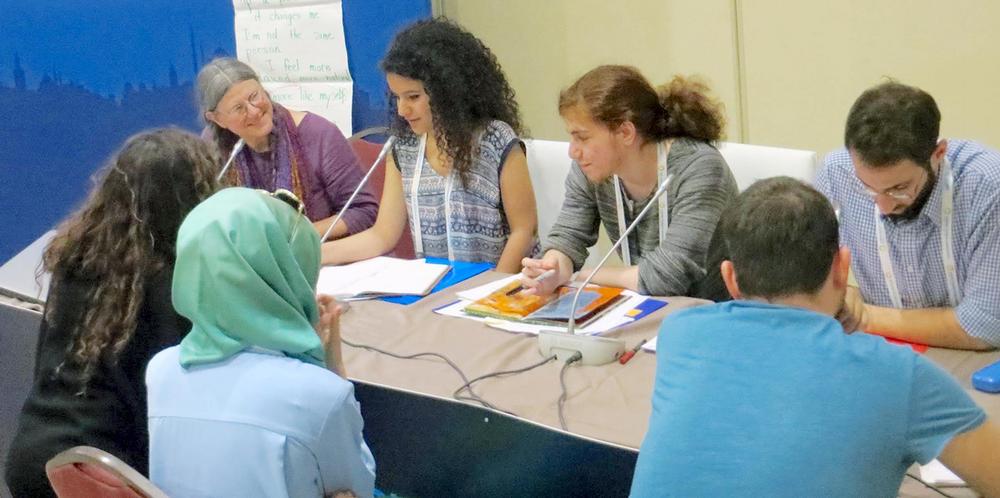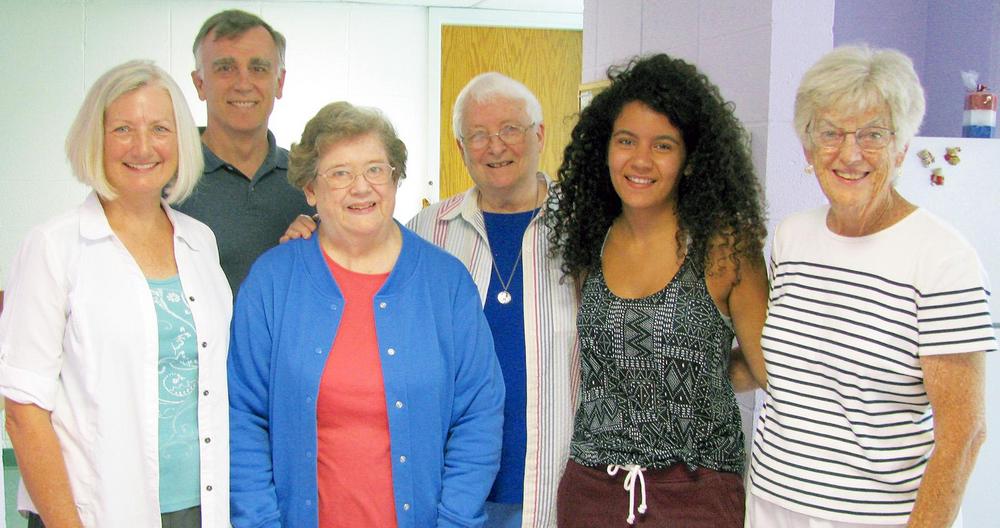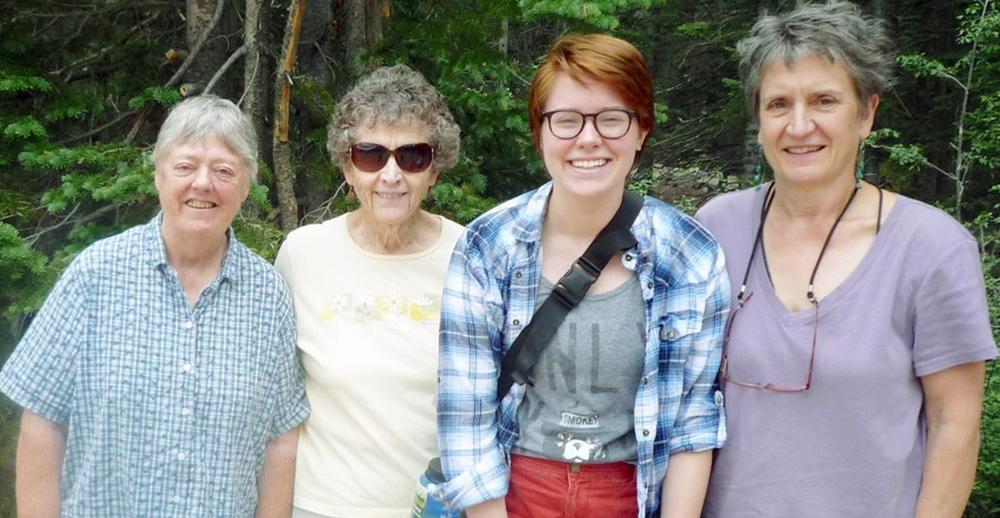Loretto Goes to World Humanitarian Summit 2016
Posted on September 1, 2016, by Loretto Community
By Theresa Kubasak
“I’ve been at the Summit for two days and this is the best thing I’ve heard! We need to listen to refugees. Everyone in Europe should be listening. We need to listen to this!”
The responder, Andrea Bellardinelli from Programma Italia Emergency, was correct in the assessment that most of the sessions at the World Humanitarian Summit did not feature the voices of refugees.
However in a session at the World Humanitarian Summit (WHS) sponsored by the Loretto Community and the U.N. NGO Committee on Migration, three Syrian refugees shared their personal writings. Wafaa, Ali and Mohamad are all students from Ad Dar, a center for Syrian and Palestinian-Syrian refugees in Istanbul. Thanks in part to the Loretto Special Needs Committee, the work of Ad Dar reaches many youth who are without their families in Istanbul, exemplifying three major themes of WHS: safety, dignity, resilience.
Loretto U.N. intern Teresa Blumenstein introduced “Writing for Resilience: A Refugee Youth Intervention Model,” which was facilitated by me. Panelists were all members of Writers’ Workshop, a group that began in June and July 2015 at Ad Dar and continues weekly via Skype.
When Teresa and I first arrived in Istanbul, we worked at Ad Dar with the students helping them choose pieces from their portfolios that they wanted to share with the delegates at the WHS.
“My writing is too personal. Why would I share it with these people I don’t even know?” Wafaa challenged.

Photo courtesy of Theresa Kubasak
“My writing doesn’t represent the whole of Syria. My writing represents me, a narcissistic teenager!” added Mohamad, age 17.
Ali knew right away he would share his reflection about jasmine, the beloved flower of Aleppo, his hometown, and all of Syria.
Samra advised Wafaa, “You should read this one about the wedding. They need to know our customs, our culture. … They need to know us.”
Samra’s comment became a reality as for 90 minutes the students took turns reading their poetry and prose to delegates on the afternoon of day two at WHS. Unfortunately, Samra was absent because she had been hit by a car while she was standing waiting for a bus. The pain in her leg, hip and back was too strong for her to travel that day.
But when Wafaa introduced herself to the panel she elaborated, “We are missing the voice of another woman today, Samra. She was supposed to be with us today, but instead I will be reading some of her writing. It’s really important to listen to the voices of women.”
Wafaa was accepted as a first-year student at Webster University in Webster Groves and has been living with the sisters at the 590 Community since August.
“Sharing my writing at the summit was something out of my comfort zone, but it turned out well,“ Wafaa reflected. “People who were there were listening carefully; it was clear in their eyes. I mainly shared personal stories and memories: my grandmother’s memory and traditional events like weddings and funerals. Just simple and emotional (for me at least) and full of details that are stuck in my memory.”
Mohamad shocked the audience with his “How to Be a Refugee,” a satirical view of the refugee situation. The reality of Mohamad’s daily life meant he had to excuse himself from the panel early to go to his high school finals. Mohamad now attends 11th grade at Friends Select School, a Quaker high school in downtown Philadelphia.
Ali has been accepted to Lewis University in Romeoville, Ill. When he began reading “Jasmine,” the delegates smiled as they listened to what seemed like a memoir of his favorite flower, but as the central image emerged, tears filled their eyes.
The writing process enhances students’ ability to develop resiliency. Through pre-writing, writing, responding, editing and revising they interact with their own words, stories and memories.
Writers’ Workshop provides opportunities to read aloud to peers in a response group, deepening connections to the issues they wrote about and deepening relationships with other members of the workshop. Building of community is one of the foremost characteristics of Writers’ Workshop at Ad Dar.
Wafaa’s pieces are reprinted here. Please go to the Loretto website to read the other pieces that Samra, Ali and Mohamad wrote for the World Humanitarian Summit. Loretto Community and the U.N. NGO Committee on Migration are grateful to these young writers for sharing their writing with the world community.

Photo courtesy of Theresa Kubasak
Writings By Wafaa Abu Elula A Funeral
Nothing more than death can bring the family together. No matter how far or close relatives they are. They all come to support each other and share the sorrow. When people are sad they become weak, and all they need is someone to rely on.
It was a big shock in my family when my eldest uncle died. He wasn’t very old, though, and he had good health. He died from a heart attack. We received a phone call from my father saying that we should all come to my other uncle’s house. My mother, sisters and I went in a hurry knowing from his voice that there was something wrong. The atmosphere was heavy when we arrived. They told us.
Within less than an hour the house was full. Relatives, friends and neighbors came to share our sorrow. All women were in two rooms and the men were in the other two.
Some women were crying, some were reading the Quran and some were doing nothing. I volunteered to serve the coffee for the arriving women. It’s a tradition to serve bitter coffee in death and to eat together.
I received many comments from the women while serving them. “Mashallah! You became a grown lady now, you are ready to marry.” I smiled to her while I was thinking, “How old fashioned she is.”

Photo by Jean M. Schildz
Another old woman asked me, “Whose daughter are you?” “Fadel’s daughter,” I answered. She smiled and told me how they used to play together when they were little. When it was time to eat, we gathered and ate sfiha, dough with meat on top of it. We eat it with yogurt, and we don’t cook it at home.
The rooms with men were quiet. They say it is a sin for men to cry. But I saw my father cry a little, of course he would. It was the biggest shock that hit my family. But with time sorrow and sadness passed. I still miss my uncle and remember him when I read because he gave me the first book in my life to read.
My Grandmother
Helwe, my grandmother, was a little girl when she lost her mother. She was raised up in Shafaamer, Palestine. My grandfather fell in love with her, but her family refused him several times, but they finally accepted him and my grandparents end up married with two children.
My grandmother was pregnant with her third child when she had to flee her country. She didn’t expect that it would take them a long time to go back. She held her children’s hands and started the journey. They walked all the way to Lebanon; the journey was extremely hard. She gave birth to my uncle, Saber, on the road, and no one was able to help her, but some women who were in the journey, too. People ended up walking with bare feet, hungry and barely carrying their children.
When they arrived to Lebanon they stayed for a while then continued to Damascus, Syria. My grandparents settled in Damascus; they lived there as refugees. My grandmother lived her life yearning for her homeland; always telling stories to her grandchildren about the life there and about the fleeing journey. She also carried her house’s keys with her, hoping that one day she would go back to her country.
My grandmother died in 2007, in a refugee camp, Syria.
Heavy Bodies
A black and white picture of men, women and children walking in the desert can only recall my grandmother’s voice in my memory. My grandmother, Helwe, used to tell me and my sisters when we were little about the journey they made when she and her family went out of Palestine in 1948.
Different time, different people but the same sorrow and tiredness in their eyes. Carrying their bodies heavily toward the unknown.
Refugees they were called.

Photo courtesy of Lisa Reyonlds
